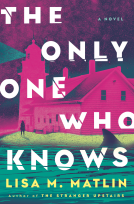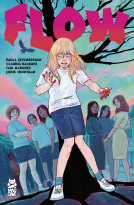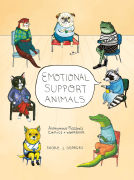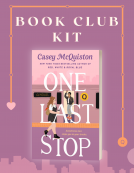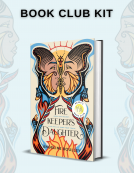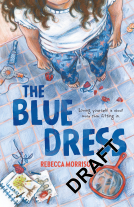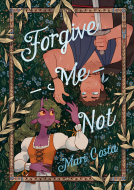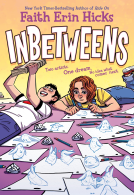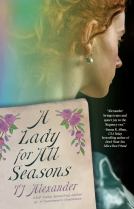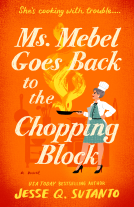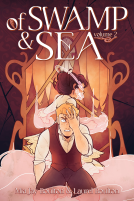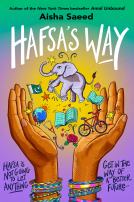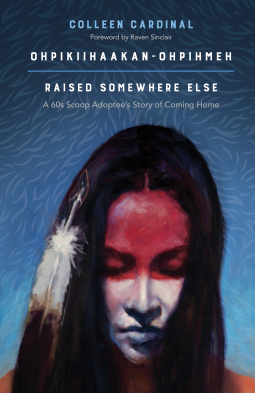
Ohpikiihaakan-ohpihmeh (Raised somewhere else)
A 60s Scoop Adoptee’s Story of Coming Home
by Colleen Cardinal
This title was previously available on NetGalley and is now archived.
Send NetGalley books directly to your Kindle or Kindle app
1
To read on a Kindle or Kindle app, please add kindle@netgalley.com as an approved email address to receive files in your Amazon account. Click here for step-by-step instructions.
2
Also find your Kindle email address within your Amazon account, and enter it here.
Pub Date Jun 01 2018 | Archive Date Nov 23 2018
Fernwood Publishing | Roseway Publishing
Description
During the 60s Scoop, over 20,000 Indigenous children in Canada were removed from their biological families, lands and culture and trafficked across provinces, borders and overseas to be raised in non-Indigenous households.
Ohpikiihaakan-ohpihmeh delves into the personal and provocative narrative of Colleen Cardinal’s journey growing up in a non- Indigenous household as a 60s Scoop adoptee. Cardinal speaks frankly and intimately about instances of violence and abuse throughout her life, but this book is not a story of tragedy. It is a story of empowerment, reclamation and, ultimately, personal reconciliation. It is a form of Indigenous resistance through truth-telling, a story that informs the narrative on missing and murdered Indigenous women, colonial violence, racism and the Indigenous child welfare system.
Advance Praise
“With Canadians slowly awakening to the reality of the 60s Scoop and its ongoing repercussions, Cardinal’s inspiring work here is essential reading and will be an integral resource for generations to come.”
— Waubgeshig Rice, author of Legacy
“Offers a window through which readers can see why cultural suppression is such a dark chapter in Canada’s history.”
— Winnipeg Free Press
Marketing Plan
- National ARC campaign
- Author readings across Canada
- National ad campaign
- Co-op advertising in indie bookstores
- National ARC campaign
- Author readings across Canada
- National ad campaign
- Co-op advertising in indie bookstores
Available Editions
| EDITION | Paperback |
| ISBN | 9781773630205 |
| PRICE | $20.00 (USD) |
| PAGES | 214 |
Links
Average rating from 8 members
Featured Reviews
For those that think that taking a child out of its culture, and raising it by another culture is just fine, this book will change your mind. For those that think that the poverty of First Nations and Native peoples are not conducive to raising children, and that they are better off with wealthier, white families, then this book will change your mind. And for those that think that children are resilient and will bounce back from anything, this book proves otherwise.
Colleen recounts how she, and her two sisters, were removed from her parents home because of neglect, and placed with a white family, and there treated like second class citizens, because they weren't their birth children.
The author says that she was told that this was better, that she was not neglected in her new home, that she was taken care of. But, her new father sexually assaulted her sister, and tried to do the same to her. He would beat them for small infractions, and treat them cruelly, and her foster mother did nothing to save her.
This is not fun reading. This is not for the faint of heart. This is something that should be read, however, to understand the damage that 60s scoop, the process of removing Indigenous children from their birth parents, did to the children.
Thanks to Netgalley for making this book available for an honest review.
 Reviewer 238609
Reviewer 238609
This book shows you the tragedy of what happens to first nations children taken from their homes. Not only did Colleen and her sisters lose their right to know their culture from a young age they were abused by their white family.
This book was hard to read and is not for the faint of heart, but it is a book that must be read. There are still native children taken from their families today who may never learn their culture.
I would like to thank Netgalley and the publisher for providing me with a review copy in exchange for my honest and unbiased opinion of it.
 Stacie C, Reviewer
Stacie C, Reviewer
Ohpikiihaakan-ohpihmeh (Raised somewhere else): A 60s Scoop Adoptee’s Story of Coming Home by Colleen Cardinal
How much do you know about the Native children in Canada that were taken from their families and put in the homes of non-Native adoptive families? I knew very little about this part of history known as the 60s Scoop. This book changed that. Through Cardinals experience I learned of the horrific practice and the effect it had on her and entire generations of people who were taken from their home, their people, their culture and placed in the homes of white families in hopes of assimilation.
What Cardinal experienced was neglect and abuse in the home that she shared with her two older sisters and adopted mother, father and brother. She was never taught about her Native culture. She was beaten and assaulted by her adoptive father, neglected by her adoptive mother as she watched her adoptive brother be treated like a prince. Her and her sisters would all eventually run. Cardinal kept running for most of her life. Into the arms of abusive men, into alcohol, into the beds of strangers. Motherhood would bring its love and its challenges. Until she realized what she was running from and sought the help she needed to heal. Heal from the wounds of growing up away from her culture. Cardinal would grow and recognize the damage caused by her being forced to assimilate. Learning the history of her people and the damaged caused by colonization and systemic racism allowed unlearn all of the racism and homophobia she accepted in herself and others. Activism and educating others would be what saved her.
This was a heart wrenching story. Not only because of her life experiences and the sexual, verbal and physical abuse she endured but the realization of what her life could have been if not for the colonial powers at work that damaged her mother, her mother’s generation and led to the damage of her own generation. It’s so disheartening. But Cardinal is healing and putting in the work to help others heal. This memoir shines a light on a dark part of Canadian colonialist history. But it’s a story everyone should read to make themselves aware of that history.
 Bharti C, Reviewer
Bharti C, Reviewer
Wow, this story is a revelation about Canada, a side of a beautiful country which has been kept hidden. With shreds of hope, snatched happiness in the vicious circle of abuse, drugs and racisim it is a wonder the author has come out alive, brave indeed.
This was a difficult book to read, so full of heartbreak and pain. I felt so bad for Colleen and her sisters. No child deserves any of what they went through. I am ashamed of her adoptive parents. Even more so because I live not too far from where they used to live. I was mortified to learn that people that lived less than 40 kilometres away from me could treat helpless and fragile children so horribly. I confess, there were tears shed on my part.
I am proud of Colleen for surviving, for seeking out help and pushing her boundaries to grow and heal. She has such strength of spirit that it is surely the only thing that saved her life.
Yes, this is a hard book to read, but it reminds us that people, women, are stronger than they look, than we think, and even stronger than they believe. It reminds us that far too many of us have forgotten how to treat our fellow human beings.
It reminds us that we are all fragile and worthy of love. No matter our gender or colour of our skin.
Tragic doesn’t even began to explain the life of Colleen Cardinal. Her biological parents, Esther and Ricky, were from Onihcikiskowapowin First Nation (Saddle Lake Cree Nation) in Alberta, Canada. This memoir is a remarkable journey for Colleen from her birth in 1972 to being torn from her parents who were deemed neglectful drunks in the first year of her life; through the horrific physical, emotional, and sexual abuse that she and her biological sisters suffered at the hands of their white adoptive father, Ronald White. Ronald, his white Mary (who was secretly biracial white and indigenous), and their biological son, Scott lived different lives than the girls who they forced into hard labor around the house and sexual abuse.
There are many passages in this book that I highlighted because the pain, misery, utter below-bottom despair, and rare signs of hope propelled me to want to keep reading even though the chapters were graphic and unpleasant traumatic stories. Colleen had five children of her own. It was hard to keep track of who fathered whom. I think there were three different fathers — all abusive to Colleen. Joseph, she described as the worst since he nearly killed her. She suffered through rape and beatings; one instance so intense she miscarried.
Colleen Cardinal’s abusive history is vital to understand because she was part of the “60’s Scoop” where Canada child services tore thousands of children from their people. They weren’t given to family or tribal kin for adoption. They were given to terrible white parents. The generation prior had been removed from their families and tribes too and sent off to residential schools which meet the definition of genocide. The white people who ran these schools forbid the indigenous students to use their native language, customs, clothing, or any identity at all.
“I thought this was how my life was meant to be: a broke-ass Indian living on welfare, just like the stereotype.”
The generational poverty, alcoholism, personality disorders, cycles of abuse, and PTSD are specifically rooted in the racism of colonialism. Colleen’s sisters had both become sex workers when they ran away from the White household. They didn’t have any choice. Unfortunately, her oldest sister Gina was murdered during this leaving behind orphaned children which different family members took stints in raising. The fleeting moments of hope came each time Colleen tried to go to college. She wanted to become a social worker and even found a long period of steady employment in crisis work. Trying to care for children without reliable babysitters forced her to leave job after job. The crisis work became too traumatizing as did what she believed would be an “easy, stress-free” job as a receptionist for the Assembly of First Nations.
Colleen was failed by the social systems in place until she finally encountered the right people — people who would dedicate their lives to helping the indigenous population. Life turned around again when she entered Sault College’s Addictions Counselor program. It was her first exposure to sharing circles and building trust in a group of people.
“I began to heal but something even more valuable was happening: I was learning spirituality, language, and culture. In my whole life I had never been exposed to smudging, praying, sweat lodge, ceremonies or any teachings about our Creator.”
The pace of the book feels natural. The author’s language changes about eighty percent through. Once Colleen had found some roots, she started to weave phrases of her Cree language into the text. Poor health forced her to seek out disability income but there was a silver lining here. She was able to set her own pace, her own passions, and begin to give to her community through public speaking. She co-founded gatherings for 60’s Scoop survivors. After finding the right friends, the right connections, there was no way not to keep internally cheering for Colleen, a woman by her own definition who failed as a mother. Her new found knowledge allowed her to educate others on the harms of colonialism, the complex PTSD (C-PTSD), and survival.
As stated, it’s not a pleasant story, but it is a necessary one that white people of North America need to read. In a time where the United States is "scooping" up children who are crossing in from Mexico looking for new lives and then sticking those children in concentration camps away from their siblings and parents, there has never been a more critical time to get educated on the trauma this causes.
Rating: 5 stars
Readers who liked this book also liked:
Nicole Georges
Comics, Graphic Novels, Manga, Nonfiction (Adult), Self-Help
We Are Bookish
Mystery & Thrillers, OwnVoices, Teens & YA
We Are Bookish
Biographies & Memoirs, Nonfiction (Adult), Parenting, Families, Relationships
Mia Jay Boulton; Laurel Boulton
Comics, Graphic Novels, Manga, Romance, Sci Fi & Fantasy
